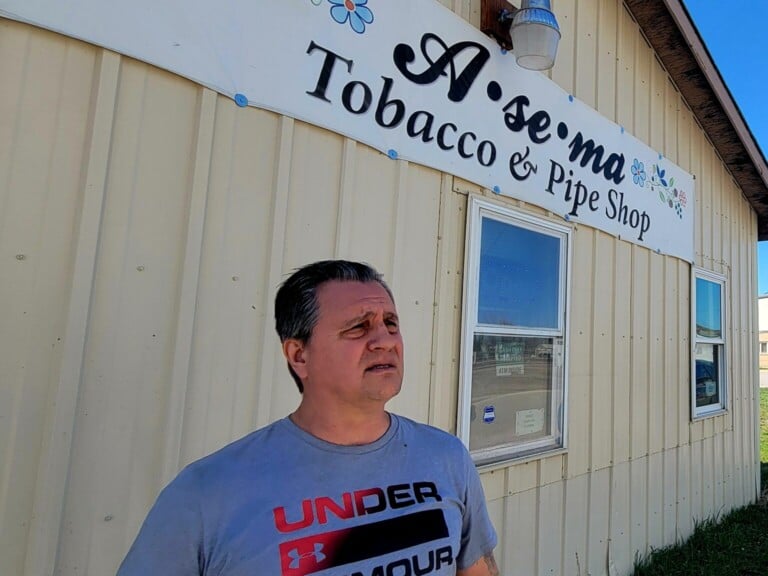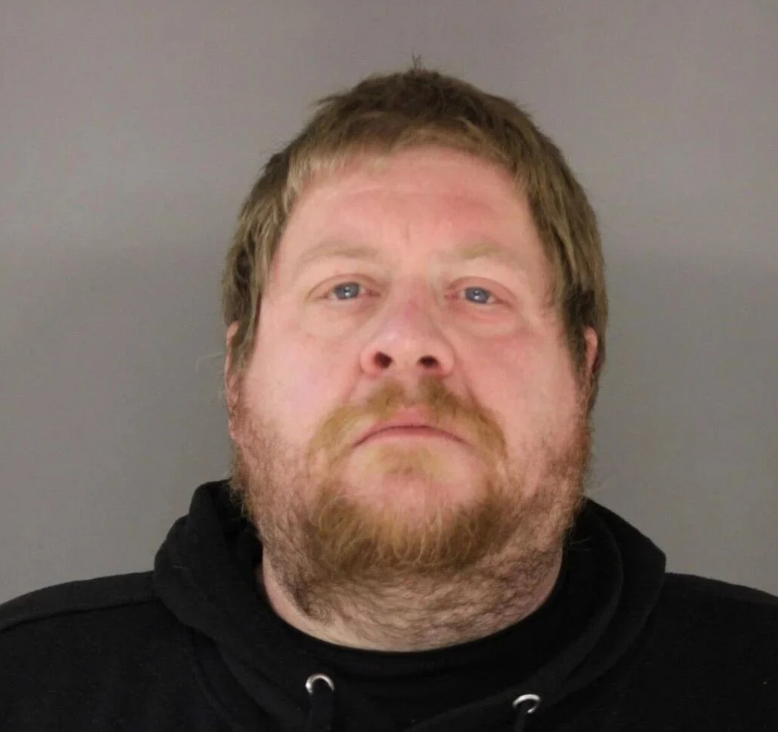On cannabis fight, Ojibwe man tests limits of the state’s authority. Again.

MAHNOMEN (Minnesota Reformer) — The day after Minnesota officially legalized recreational marijuana in August 2023, agents with the Paul Bunyan Drug Task Force raided a squat, single story cinderblock building across the railroad tracks from a grain elevator in the sleepy northwestern Minnesota town of Mahnomen.
The search of the Asema Tobacco & Pipe Shop yielded approximately 7.5 pounds of marijuana, much of it stored in plain sight in mason jars bearing labels like “Black Plague” and “Ghost Candy.” Investigators also seized just under a pound of marijuana wax and, from the till and several people who were present, $2,748 in cash.
Eight months later, Todd Jeremy Thompson, Asema’s owner, was charged by the Mahnomen County Attorney with one count of felony first-degree possession of marijuana.
For Thompson, a blunt talking, occasionally profane 56-year-old enrolled member of the White Earth Band of Ojibwe, neither the raid nor the criminal case came as a surprise.
“I was told by certain individuals that they were going to come. Two different sources,” Thompson told the Reformer during a pair of wide-ranging interviews at what he refers to as his “old school head shop.”
Still, those warnings did not dissuade Thompson from exercising what he believes are his rights under treaty law, applicable federal precedent, Minnesota’s 2023 cannabis legalization law, and the constitution of the Minnesota Chippewa Tribe.
Thompson has a long history of successfully asserting his rights as a Native in the face of an array of legal authorities, but this constitutional clash is not without risk: He could face up to five years in prison and a $10,000 fine.
In the more than two years that have passed since the raid, the retail sale of marijuana has exploded across Minnesota, first with a proliferation of tribally-owned dispensaries located on reservations, and more recently, with a slew of tribal and non-tribal outlets opening off-reservation.
At White Earth, Thompson explained as he gave a driving tour of Mahnomen, the band got a head start in the burgeoning industry because it already had a functional medical marijuana operation up and running.
Rolling down the road, it’s hard to miss that enterprise, which is every bit as aromatic as you would guess. The growhouse is located in a 40,000-square-foot former potato chip factory, now encircled with tall fences and concertina wire. The tribally run dispensary, Waabigwan Mashkiki, is close too, just across the street from the Shooting Star Casino.
As his court case drags on, Thompson has continued to operate Asema, where products on display include bulk tobacco, incense, posters, and a wide array of paraphernalia: glassware, vapes, stash containers, cheap cigars, wraps, vape juice, scales and the like.
Competition from the tribal dispensary has cut into his glassware sales, said Thompson. He’s still making enough to pay his bills, he said, adding ruefully that he probably won’t be in the market for a new truck any time soon.

Products arrayed at Todd Thompson’s head shop. Business is down and competition is up since the onset of legal cannabis, Thompson says. (Photo by Mike Mosedale/Minnesota Reformer)
In seeking dismissal of the felony charge, Thompson’s defense has hinged largely on a jurisdictional claim.
Under a 1953 law called Public Law 280, the U.S. Congress granted policing authority on Indian reservations to state law enforcement in six states, including Minnesota. But, broadly speaking, that authority does not extend to what are referred to as civil/regulatory matters. So when Minnesota legalized marijuana, the argument goes, the regulation of cannabis on reservations fell outside the purview of state courts.
Thompson’s defense also points to the language of the 2023 state law that legalized recreational marijuana in Minnesota. That law explicitly “acknowledges the sovereign right of Minnesota Tribal governments to regulate the cannabis industry and address other matters of cannabis regulation [on reservations].”
Nonetheless, in March, District Court Judge Seamus Duffy rejected Thompson’s motion to dismiss. In his ruling, Duffy allowed that it was a close call but pointed out that Minnesota’s cannabis law still contains criminal provisions, including limits on allowable quantities and a prohibition on products such as marijuana wax.
Duffy was less sympathetic to a second argument — that possession and sale of cannabis by Thompson and other band members is a reserved right under the 1855 treaty. Noting that the treaty is silent on the subject and that cannabis use among the Ojibwe is a relatively modern phenomenon, the judge wrote that “Thompson has not shown that marijuana was envisioned with any of the reserved rights at the time of the Treaty.”
The legal setback proved fleeting.
In a highly unusual move, the Minnesota Court of Appeals agreed to take up Thompson’s appeal prior to the conclusion of the district court case. The grant of this interlocutory appeal typically signals a court’s view that the case raises a significant legal question.
Oral arguments are scheduled for November 4.
A history of standing up for Indigenous rights
The Asema raid is not the first time Thompson has found himself in legal crosshairs of state law enforcement. In the past decade, Thompson has been involved in long-running court cases that tested the bounds of state authority over netting fish and harvesting wild rice in the so-called “ceded territories” — land that the Ojibwe sold to the U.S. government in a series of 19th century treaties.
After extensive legal wrangling, he came out on top both times. In the fishing case —brought after Thompson and a friend set gill nets in Gull Lake — the Office of Crow Wing County Attorney dismissed the charge after a district court judge found that Thompson, as a White Earth band member, retained the right to fish on Gull Lake. (Thompson’s friend, a Fond du Lac band member, was convicted after the judge ruled that Fond du Lac band was not a signatory to the relevant treaty.)
Last spring, a different district court judge dismissed the ricing case after concluding that the state had violated Thompson’s right to a speedy trial by charging him, dismissing the charge after three months, and then re-charging eight months later.
Thompson also successfully rebuffed a trespass charge stemming from his participation in a 2021 protest over the construction of an oil pipeline, called Line 3, across the headwaters of the Mississippi River
In that fight, Thompson managed to get the case transferred to White Earth’s tribal court. In dismissing the charge, Tribal Court Judge David DeGroat ruled that Thompson’s actions were “in conformity with the goal of protecting environmental resources that impact ceded and reservations land.”
Thompson’s string of legal victories — and his willingness to put his neck on the line — has earned him admirers.
“Todd is out in front of most tribal members trying to figure out how to use treaty rights for economic benefit, whether it is standard hunt, fish and gather, or if it is something a step beyond,” said Frank Bibeau, a White Earth band member and an attorney for the 1855 Treaty Authority, which advocates for Ojibwe people’s off-reservation rights. “To me, Todd is the tip of the spear. He can see what his rights are. He doesn’t need to be told.”
Bibeau is not representing Thompson in the Asema case, though he filed a friend of the court brief on behalf of the 1855 Treaty Authority.
Claire Glenn, a former Hennepin County public defender who now works with the Climate Defense Project, is Thompson’s attorney in the cannabis case.
Glenn got to know Thompson when she represented him — and nearly 100 other “water protectors” — who were involved in the Line 3 protests. More recently, she was his attorney in the ricing case that was dismissed this spring.
“He has a lot of integrity,” Glenn said of Thompson. “He lives his life in accordance with his values and without apologies. He has undertaken his own study of the treaties and the history of treaty making and Indigenous genocide. And he has learned a lot from the elders who came before him.”
An urban upbringing, mentoring by a spiritual tutor
Thompson grew up middle class, mainly in Minneapolis, where his father, Leonard, was a firefighter who pushed the Minneapolis Fire Department to loosen regulations limiting hair length for Native Americans.
Thompson’s parents used to send him to the reservation during the summer, where the family still had property. At times, he stayed with a great-grandfather, Frank, who lived in a tar paper shack — not far from Thompson’s current home.
For a city kid, the close-to-the land life of his kin took some getting used to.
“He didn’t go to the store to buy meat. He shot deer, beaver, muskrat, whatever,” Thompson recalled. “For dinner, he would come out with a pan with some roasted animal — teeth and still head on — and you had to pick off your meat.” Accustomed to grocery store food, Thompson found it difficult to choke down the rustic fare.
“But after three days of starving, man, you started eating,” he added with a laugh.
As a teen, Thompson drifted from early interests in boxing and hockey and started partying and chasing girls. He caused enough trouble that his parents didn’t hesitate when he expressed an interest in attending a Native American boarding school in Flandreau, South Dakota.
“A friend of mine, a Red Laker in Minneapolis, told me about the school. Made it sound all really cool and all that sh*t,” Thompson recounted. “And so I told my folks, ‘Hey, I’m thinking about heading out with Maynard and Tony and them guys.’ My dad was like, ‘That’s a great idea’ just to get rid of me because I was a hell raiser, only child.”
Although he only lasted one year at Flandreau, it made an impression on Thompson. He was exposed to some Native religious traditions for the first time and, he said, had mystical experiences.
“That was the first sweat lodge I ever went to. And it was a pretty powerful, profound f***ing experience,” he said. Other cultural practices also made an impression, especially the drums. “I didn’t know why, but when they would be playing the drum, my f***ing hair would stand up on the back of my neck and then just, I’d get that tingle.”
A year in boarding school was enough, Thompson said, so he returned to Minnesota and moved to St. Francis, in rural Anoka County, where his parents acquired a hobby farm. Thompson finished his last two years of high school in the exurbs but, he said, he struggled to fit in. “There were no Indian people there,” he said. “It was f***ing deadass country sh*t.”
As a young man, Thompson bounced around, got a DWI, and ultimately moved back to Minneapolis where he attended technical college and got a degree in graphic design. For a time, he worked at The Circle, a Native American newspaper in south Minneapolis.
He started a family and had four kids. At the same time, he found himself increasingly drawn to Native traditions. A seminal moment came when he attended a lecture at the American Indian Center by Eugene Begay, a revered spiritual leader and fluent Ojibwe speaker from Lac Courte Oreilles reservation in Wisconsin.
“I listened to his talk and I’m like, man, there’s something going on here,” Thompson recalled. “And after his talk, I told him some things and he was like, ‘Yeah, why don’t you come on up and move in with me?’ He said, ‘I’ll show you a few things. I’ll teach you some things.’ I didn’t know what the hell he meant by that. But that sh*t kept beating away at me for about two weeks. And I just told the old lady, I said, ‘I’m going to go spend some time up there with that old man.’ I ended up living with him for two years.”
Begay had lost a leg, so Thompson took on a role as a helper and chauffeur, driving Begay to ceremonies and AA talks.
Begay was not the only elder to influence Thompson.
As a young man, he was arrested during the heyday of the treaty rights fight at Mille Lacs, a legal battle that ultimately culminated with a 1999 U.S. Supreme Court decision upholding the rights of Ojibwe people to hunt, fish and gather in territory that the Ojibwe ceded to the U.S. government in a treaty in 1837.
Thompson’s recollection of the episode revolves less around the legal nuances than the wild scene that unfolded at the boat landing. When the game wardens arrived at the scene to ticket the Native anglers for setting nets, Thompson said, he attempted to elude them by diving into the still icy waters.
“I was the only one that ran in the water. I don’t know why, but I ran in f***ing water,” he said. “They arrested Vernon Bellecourt [the late American Indian Movement leader] and they arrested my dad. I’d swim 20, 25 feet, and pop up. I kept yelling: ‘I’m practicing my 1837 treaty rights!’ Eventually, I got too cold. So then they grabbed me, pulled me in a boat, and I went to jail. The next day they’d let us go, give us our canoe back.”
Another influence, Thompson said, was his uncle, Marvin Manypenny, father of Lt. Gov. Peggy Flanagan, and a well known White Earth land back activist. (Although they are cousins, Thompson said he is not close to Flanagan.)
About 18 years ago, Thompson decided city life was not for him. He had a good job at the time, laying water lines, and a nice home in the St. Paul suburbs. He had been thinking about leaving for years before he finally broke the news to his then-partner and mother of his kids.
“I came home one day from work and I said, ‘I’m moving, babe. I hope you come with me.’ And she was like, ‘Let me think about it.’ And then she said, ‘No, I’m staying.’ I went and got a U-Haul truck loaded all my sh*t up, and I drove up north here and we worked out things with the kids and I found a house to rent.”
After saving for a spell, Thompson went to the White Earth land office and successfully applied for an allotment — an acre and a quarter near the community of Naytahwaush — where he now lives.
When he opened his head shop Asema in 2019, Thompson said, no one in the vicinity was selling paraphernalia or bulk tobacco. These days, business is down and competition is up. Thompson said he hopes to stick it out.
“Will I be able to keep going? Who knows? I’ll push it as long as I can,” he said. “But I love being my own boss. I will say that, man.”
Whether he can remain his own boss will likely hinge on the outcome of his court case.
Asked why he takes legal risks again and again, Thompson paused for a moment.
“I always tell myself I’m going to stop messing around with courts,” he said. “But, man, it’s in my DNA.”
(Story written by Mike Mosedale – Minnesota Reformer)






